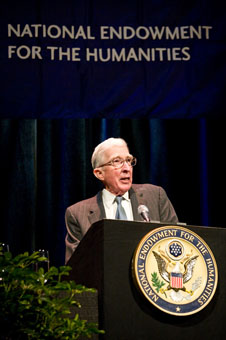Frases célebres de John Updike
John Updike Frases y Citas
Rabbit, Run
“El uno mismo esencial es inocente, y cuando prueba su propia inocencia sabe que vive para siempre.”
John Updike: Frases en inglés

Fuente: Self-Consciousness : Memoirs (1989), Ch. 6
Fuente: My Father's Tears and Other Stories
“Dreams come true; without that possibility, nature would not incite us to have them.”
Fuente: Self-Consciousness : Memoirs (1989), Ch. 3
“Sex is like money; only too much is enough.”
Fuente: Couples (1968), Ch. 5
Hugging the Shore, foreword (1983)
“The inner spaces that a good story lets us enter are the old apartments of religion.”
Introduction to The Best American Short Stories of 1984 (1984)
“The only way to get somewhere, you know, is to figure out where you're going before you go there.”
Rabbit, Run (1960)
“[Mr Shimada] "Toyota does not enjoy bad games prayed with its ploduct."”
Rabbit at Rest (1990)
The Centaur (1963)
Contexto: I miss only, and then only a little, in the late afternoon, the sudden white laughter that like heat lightning bursts in an atmosphere where souls are trying to serve the impossible. My father for all his mourning moved in the atmosphere of such laughter. He would have puzzled you. He puzzled me. His upper half was hidden from me, I knew best his legs.
“It was true of my generation, that the movies were terribly vivid and instructive.”
Salon interview (2000)
Contexto: It was true of my generation, that the movies were terribly vivid and instructive. There were all kinds of things you learned. Like the 19th century novels, you saw how other social classes lived — especially the upper classes. So in a funny way, they taught you manners almost. But also moral manners. The gallantry of a Gary Cooper or an Errol Flynn or Jimmy Stewart. It was ethical instruction of a sort that the church purported to be giving you, but in a much less digestible form. Instead of these remote, crabbed biblical verses, you had contemporary people acting out moral dilemmas. Just the grace, the grace of those stars — not just the dancing stars, but the way they all moved with a certain grace. All that sank deep into my head, and my soul.
Salon interview (2000)
Contexto: In the old movies, yes, there always was the happy ending and order was restored. As it is in Shakespeare's plays. It's no disgrace to, in the end, restore order. And punish the wicked and, in some way, reward the righteous.
On London, in “A Madman,” New Yorker (22 December 1962)
“His upper half was hidden from me, I knew best his legs.”
The Centaur (1963)
Contexto: I miss only, and then only a little, in the late afternoon, the sudden white laughter that like heat lightning bursts in an atmosphere where souls are trying to serve the impossible. My father for all his mourning moved in the atmosphere of such laughter. He would have puzzled you. He puzzled me. His upper half was hidden from me, I knew best his legs.
“Vocations drying up, nobody wants to be selfless any more, everybody wants their fun.”
Rabbit at Rest (1990)
Contexto: Now nuns have blended into everybody else or else faded away. Vocations drying up, nobody wants to be selfless any more, everybody wants their fun. No more nuns, no more rabbis. No more good people, waiting to have their fun in the afterlife. The thing about the afterlife, it kept this life within bounds somehow, like the Russians. Now there's just Japan, and technology, and the profit motive, and getting all you can while you can.
“I think “taste” is a social concept and not an artistic one.”
Interview in New York Times Book Review (10 April 1977). later published in Conversations with John Updike (1994) edited by James Plath, p. 113
Contexto: I think “taste” is a social concept and not an artistic one. I’m willing to show good taste, if I can, in somebody else’s living room, but our reading life is too short for a writer to be in any way polite. Since his words enter into another’s brain in silence and intimacy, he should be as honest and explicit as we are with ourselves.
“Our brains are no longer conditioned for reverence and awe.”
Fuente: Self-Consciousness : Memoirs (1989), Ch. 6
Contexto: Our brains are no longer conditioned for reverence and awe. We cannot imagine a Second Coming that would not be cut down to size by the televised evening news, or a Last Judgment not subject to pages of holier-than-Thou second-guessing in The New York Review of Books.
“The pain of the world is a crater all these syrups and pills a thousandfold would fail to fill.”
Rabbit Redux (1969)
Contexto: His insides are beginning to feel sickly. The pain of the world is a crater all these syrups and pills a thousandfold would fail to fill.
Rabbit, Run (1960)
Contexto: He feels the truth: the thing that has left his life has left irrevocably; no search would recover it. No flight would reach it. It was here, beneath the town, in these smells and these voices, forever behind him. The fullness ends when we give Nature her ransom, when we make children for her. Then she is through with us, and we become, first inside, and then outside, junk. Flower stalks.
“We live down here among shadows, shadows among shadows.”
Act I
Buchanan Dying (1974)
Contexto: Facts are generally overesteemed. For most practical purposes, a thing is what men think it is. When they judged the earth flat, it was flat. As long as men thought slavery tolerable, tolerable it was. We live down here among shadows, shadows among shadows.
“Facts are generally overesteemed. For most practical purposes, a thing is what men think it is.”
Act I
Buchanan Dying (1974)
Contexto: Facts are generally overesteemed. For most practical purposes, a thing is what men think it is. When they judged the earth flat, it was flat. As long as men thought slavery tolerable, tolerable it was. We live down here among shadows, shadows among shadows.
“Suspect each moment, for it is a thief, tiptoeing away with more than it brings.”
A Month of Sundays (1975)
Fuente: A Month Of Sundays
“If you have the guts to be yourself, other people'll pay your price.”
Fuente: Rabbit, Run
“I want to write books that unlock the traffic jam in everybody's head.”
Fuente: Hugging the Shore: Essays and Criticism
“How can you respect the world when you see it's being run by a bunch of kids turned old?”
Fuente: Rabbit Is Rich
